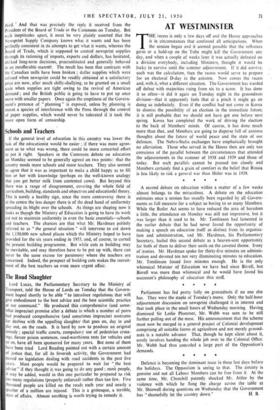AT WESTMINSTER
THE recess is only a few days off and the House approaches it in circumstances that confound all anticipations. When the session began and it seemed possible that the influenza germ or a hold-up on the Tube might kill the Government any day, and when a couple of weeks later it was actually defeated on a division everybody, including Ministers, thought it would be lucky to survive until the summer adjournment. If it did survive, such was the calculation, then the recess would serve to prepare for an electoral D-day in the autumn. Now comes the recess and, with it, what a different situation. The Government has warded off defeat with majorities rising from six to a score. It has done it so often—it did it again on Tuesday night in the groundnuts division—that it apparently feels that at a pinch it might go on doing so indefinitely. Even if the conflict had not come in Korea to dismiss the possibility of an election in the immediate future, it is still probable that we should not have got one before next spring. Korea has completed the work of driving the election to the back of Members' minds. Of course, it has done much more than that, and Members are going to disperse full of anxious thoughts about the future of world peace and the state of our defences. The Nehru-Stalin exchanges have emphatically brought no alleviation. Those who served in the House then are only too conscious of the parallel between the circumstances that attended the adjournments in the summer of 1938 and 1939 and those of today. But such parallels cannot be pressed too closely and Members certainly find a grain of comfort in the belief that Russia is less likely to risk a general war than Hitler was in 1939.
* * * * A second debate on education within a matter of a few weeks almost belongs to the miraculous. A debate on the education estimates once a session has usually been regarded by all Govern- ments as full measure for a subject so boring to so many Members. While the Butler Act seems to have reduced the area of boredom a little, the attendance on Monday was still not impressive, but it . was larger than it used to be. Mr. Tomlinson had lamented in the earlier debate that he had never found the opportunity of making a speech on education itself as distinct from its organisa- tion and administration, and Mr. Hardman, his Parliamentary Secretary, hailed this second debate as a heaven-sent opportunity for both of them to deliver their souls on the coveted theme. Irony of ironies. Mr. Hardman spoke for thirty-five minutes on adininis- tration and devoted ten not very illuminating minutes to education. Mr. Tomlinson found four minutes enough. He is the only whimsical Minister of Education we have had since Birrell, but Birrell was more than whimsical and he would have found his successor's philosophy of education thin stuff.
* * Parliament has fed pretty fully on groundnuts if no one else has. They were the staple of Tuesday's menu. Only the half-hour adjournment discussion on newsprint challenged it in interest and that took place in the small hours of Wednesday morning. Having dismissed Sir Leslie Plummer, Mr. Webb was seen to be still further pulling out of the mess. His announcement that the scheme must now be merged in a general project of Colonial development comprising all suitable forms of agriculture and not merely ground- nuts is a notable advance That, though he kept silent about it, surely involves handing the whole job over to the Colonial Office. Mr. Webb had thus conceded a large part of the Opposition's demands.
* * * * Defence is becoming the dominant issue in these last days before the holidays. The Opposition is seeing to that. The anxiety is genuine and not all Labour Members can be free from it. At the same time, Mr. Churchill patently shocked Mr. Attlee by the violence with which he flung the charge across the table at Mr. Shinwell during questions on Wednesday that the Government has " shamefully let the country down." H. B.


































 Previous page
Previous page